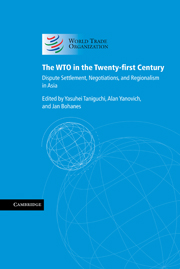Book contents
- Frontmatter
- Contents
- Notes on contributors
- Acknowledgements
- Table of dispute settlement cases and reports
- List of abbreviations
- Introduction
- PART I The WTO at Ten
- PART II Accomplishments and Future Prospects of the WTO Dispute Settlement System
- PART III Asian Perspectives on WTO Dispute Settlement
- PART IV The Doha Development Agenda and Beyond
- 16 The central place of market access for the WTO's development round
- 17 Agricultural issues in the Doha Development Agenda negotiations
- 18 Beyond Doha: reflections on the future of trade remedies
- 19 Reflections on the relationship between WTO negotiations and dispute settlement: lessons from the GATS
- 20 Trade in services and sustainable development in the context of the WTO: the case of higher education
- 21 The WTO and sustainable development
- PART V Asian Regional Integration and the Multilateral Trading System
- Index
20 - Trade in services and sustainable development in the context of the WTO: the case of higher education
from PART IV - The Doha Development Agenda and Beyond
Published online by Cambridge University Press: 05 March 2012
- Frontmatter
- Contents
- Notes on contributors
- Acknowledgements
- Table of dispute settlement cases and reports
- List of abbreviations
- Introduction
- PART I The WTO at Ten
- PART II Accomplishments and Future Prospects of the WTO Dispute Settlement System
- PART III Asian Perspectives on WTO Dispute Settlement
- PART IV The Doha Development Agenda and Beyond
- 16 The central place of market access for the WTO's development round
- 17 Agricultural issues in the Doha Development Agenda negotiations
- 18 Beyond Doha: reflections on the future of trade remedies
- 19 Reflections on the relationship between WTO negotiations and dispute settlement: lessons from the GATS
- 20 Trade in services and sustainable development in the context of the WTO: the case of higher education
- 21 The WTO and sustainable development
- PART V Asian Regional Integration and the Multilateral Trading System
- Index
Summary
The World Trade Organization (WTO) is the pre-eminent body governing international trade, including international trade in services. The WTO's General Agreement on Trade in Services (GATS) aims to liberalize trade in services. GATS is a multilateral, legally enforceable agreement. Education services, including higher education, are one of the 12 broad sectors included in the GATS. WTO Members of the WTO are currently pursuing the goal of further liberalization of trade in services as part of the Doha Development Agenda. Without the appropriate guidance, these negotiations may bring about practical and regulatory effects that negatively impact sustainable development.
The purpose of this chapter is to focus attention on trade in higher-education services and its possible impact on sustainable development. It examines the GATS and seeks to raise awareness about the importance of sustainable development. It also aims to stimulate debate and analysis of the role of governments and the WTO in promoting sustainable development through trade in higher-education services.
GATS and the education sector
The GATS has existed since 1995. The purpose of the GATS is to reduce or eliminate barriers to trade in services. It is a worldwide agreement covering all 149 WTO Members. GATS is the first multilateral agreement on trade in services. Education is one of the 12 primary service sectors. There are five subsectors in education: primary, secondary, higher, adult, and other.
The GATS has three parts. The first part is the framework that contains the general principles and rules. The second part consists of the national schedules that list a WTO Member's specific commitments on access to its domestic market for foreign providers.
- Type
- Chapter
- Information
- The WTO in the Twenty-first CenturyDispute Settlement, Negotiations, and Regionalism in Asia, pp. 381 - 394Publisher: Cambridge University PressPrint publication year: 2007

